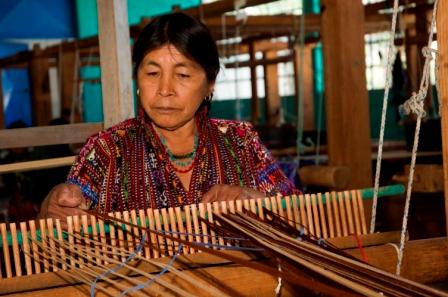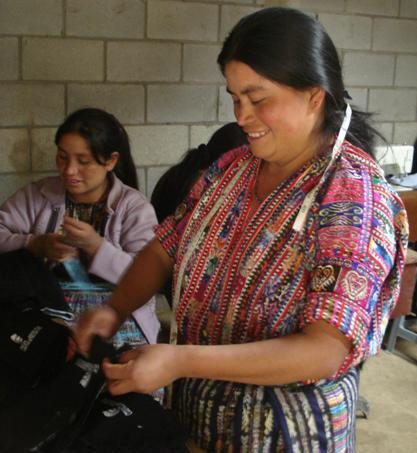Maya Weaving is Alive Today: Fair Trade Conference Bags and the Levi Strauss Foundation
First, a little history. Since the Classic Period of Maya civilization (250-900 CE), cotton has been a fundamental component in the Maya economy and especially in the creation of their beautiful traditional weavings. The maintenance of this style of weaving is a method that Guatemalan indigenous women have utilized to resist the many forces that threaten to erode their cultural heritage. During the Guatemalan Civil War, the military attempted to destroy the indigenous culture by preventing them from practicing their traditional arts. The Guatemalan army attacked many of the highland indigenous communities with which Mercado Global works, smashing thousands of weaving looms. Today, the impersonal tides of globalization threaten to sweep away all cultural heterogeneity in their path. How are these cultures to survive if it is more profitable to sell kitchy, inexpensive souvenirs for tourists?

Eulalia Saloj Guitz, from the Chaquijya Cooperative in Sololá, prepares her loom to weave.
One of the many satisfactions I find in my work with Mercado Global is providing these women the opportunity to adapt the artistic practices of their ancestors to modern demands. The fabric woven for Mercado Global’s fair trade, eco-friendly, and hand-made conference bags is made of 100% cotton, woven on back-strap and floor looms, and sewn and embroidered in the homes of our partner artisans.
The Mercado Global Fair Trade Conference Bag program is one of the principal means by which we provide indigenous women artisans an income-generating sales outlet. This year, we want to thank the Levi Strauss Foundation for providing so much work for our partner artisans by sponsoring the purchase of conference bags. As a result of these orders, we have been able to supply every single member of our eleven partner sewing and weaving cooperatives with consistent fair wage income.

Bartola Pixtay prepares conference bags for the Council on Foundations Conference, an order sponsored by the Levi Strauss Foundation.
This unprecedented opportunity for fair wage work has supported our partner artisans in their commendable efforts to break the cycle of poverty that afflicts so many highland indigenous people in Guatemala. For the first time, the expensive Guatemalan educational system which holds the key to social advancement is now within reach; the dirt floors which cause so much disease and discomfort in our partner artisans’ homes are being paved; rates of access to electricity and potable water have increased to levels well above the rural Guatemalan average; and the nutritional value of the food our partner artisans feed their children has increased dramatically. As we rapidly expand the market for fair trade products, it is exciting to think of the impact that bringing this model to more communities will have.
We’d like to thank Levi’s for helping make this possible.






 Follow us on Twitter
Follow us on Twitter Join us on Facebook
Join us on Facebook Sign up for Mailing List
Sign up for Mailing List